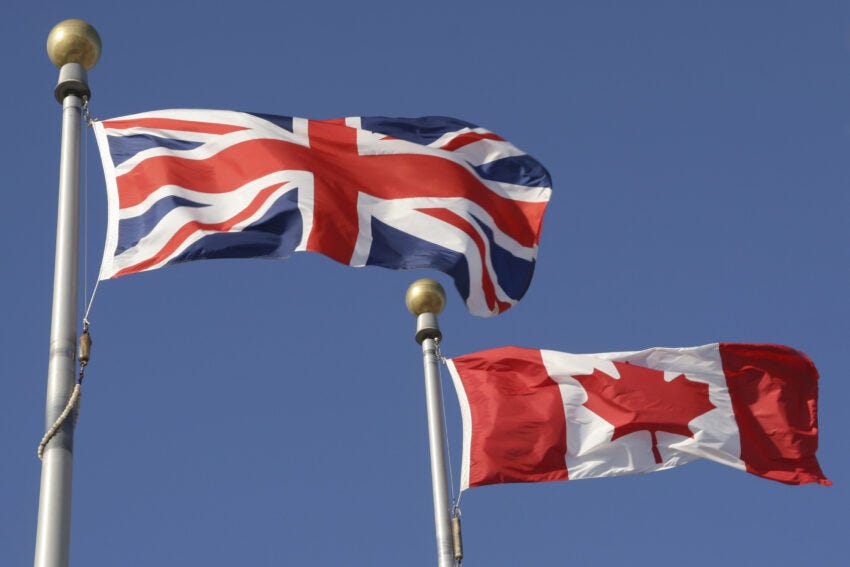Turns out that Trump’s trade policy is even more eccentric and erratic than many commentators expected. He has announced that he is going to slap 25 per cent tariffs on goods on Mexico and Canada (10 per cent for oil) and will likely do something similar to the EU all while taking a less hard line on China.
Not only is this an economically illiterate way to conduct trade policy which will lead to a trade war which makes everyone poorer, it is also no way to treat allies such as Canada. I’m not American so I don’t like to comment too much on how other administrations and countries conduct their affairs but it is shameful to see so many apparently patriotic conservatives support Trump’s attempts to coerce Canada – which is one of our oldest and closest allies – into being subjugated by the US simply because they adore Donald Trump and hate the current Canadian government.
Moreover, there have been a lot of bad takes flying around stating that Trump’s tariffs are good so long as they’re not levied on the UK as we will be comparatively better off. I wrote back in November why this is nonsense. Trump’s tariffs and the ensuing trade war will make the US and the other belligerents in the trade war poorer. This means that they will have less money to buy our stuff and to make investments in their firms to allow them to boost productivity and sell us cheaper goods. We will be poorer as a result. Nobody wins in a trade war.
As I wrote last month, I think that it is less likely that the UK will be hit with tariffs given that we don’t have a trade surplus in goods with the US and even if we are it will have less of an impact on our economy. Apparently the UK government is working on plans to retaliate with its own tariffs in the event of Trump imposing tariffs on the UK. There are also some commentators arguing that we should retaliate anyway in solidarity with Canada and Mexico. They’re wrong, as I set out in the article we shouldn’t retaliate under almost any circumstance. You can read it for yourself but in summary: Trump’s tariffs will hurt us less than other countries so there is less of a rush to get them removed; we should use our independent trade policy to distinguish ourselves from much of the rest of the world and make the case for free trade and; retaliatory tariffs will make exacerbate the cost of living crisis.
If it does look as though Trump will levy tariffs on UK goods then here is how I think it could all be resolved without retaliating and sparking a trade war.
All this aside, we should be showing solidarity towards Canada. It has stood by our side through some of our darkest moments and it has been treated unfairly by Trump. The most effective way of doing this is by boosting trade and investment between our two nations.
Thankfully we already have a very good trading relationship with Canada due to the continuity agreement and CPTPP. However, this can and should be built on and so we should seek to eliminate all tariff and non-tariff barriers between the UK and Canada.
While I don’t want to be one of those ‘X means we should do Y (something which I’ve always called for)’, I am going to do it anyway. The first step should be to lift the ban on hormone treated beef. It is deeply insulting to our Canadian friends to suggest that they have lower food safety standards than the UK and so it would be a strong sign of solidarity as we recognise that our current ban is not only unscientific given that hormone treated beef is perfectly safe, it was also insulting.
Perhaps more importantly such a move would very much be in the UK’s interests. It would help to pave the way to the abolition of all tariffs, TRQs, and non-tariff barriers to UK goods and services which would boost UK exports and increase profits for UK firms and support jobs for British workers. It would also increase consumer choice and lower prices for households given that beef is more efficiently produced in Canada. While some beef producers in the UK would take a hit, it would encourage many of them to be more productive which would lead to farming being more profitable and sustainable in the future.
Finally, as much of the rest of the world becomes more insular and retreats from free trade the UK has the opportunity to continue to make the case for open markets and free trade underpinned by the international rules based system.
Trump’s impact on trade will be significant, but it needn’t be permanent or permanently scar the world economy. The UK should seek to remain as open as possible, champion free trade, and push for reforms of the international trading system in order to minimise the damage caused by Trump.



